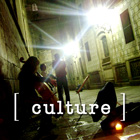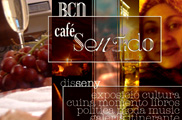
|
||||||||||||||||||||||
FEAR ENDANGERS BY DECEIVING The fear and uneasiness that provokes human beings to conflict is never what it seems to be; that is its nature and its method: to take hold by way of complex deceptions. Fear wages a coup d'esprit by deceiving the mind into thinking it promises clarity and intellectual comfort, peace of mind, justice and the healing of wounds, that it may actually generate the only feasible path to physical or political safety. [Full Story] UN NAMES 10 MOST UNDER-REPORTED STORIES FOR 2006 Every year, the United Nations publishes a list of the 10 most serious stories most overlooked by global press. Developing nations, whose situations are often misunderstood or dismissed by news media, as too complicated, intractable, or of marginal relevance, take the spotlight this year. [Full Story] PRESS FREEDOM IS EVERYONE'S FREEDOM The freedom of the press is the freedom of the American people. Not its guarantor, not a metaphorical representation of freedom as an idea, not even merely a mainstay of a free system. A free and independent press is American liberty at work, building and defending itself against the slide toward secret or arbitrary exercise of power, as conceived within or beyond the legal process. [Full Story] CLIMATE OF SECRECY PUTS DEMOCRATIC PRINCIPLES IN BACK SEAT An insistence on near absolute secrecy threatens to undermine two vital elements of the security of the United States: 1) the democratic process itself, without which there can be no system to secure; 2) the intellectual dissent which is necessary to enforce truly reasoned thinking in planning of operations and information analysis. [Full Story] CHINA PLANS "SMOKELESS WAR" AGAINST PRESS, DISSIDENTS China's president Hu Jintao has reportedly called for an intensive crackdown on media liberties. While China's government has sought to project an image of a more market-oriented, open system, it continues to forbid basic press freedoms and still persecutes journalists at an alarming rate. [Full Story] |
RUSSIAN STATE-OWNED MEDIA LAUNCH SMEAR CAMPAIGN AGAINST LITVINENKO
INVESTIGATORS NOW SUSPECT TWO RADIATION ATTACKS ON SAME DAY, FURTHER TRACES FOUND IN HAMBURG 9 December 2006 After Russia launched an official criminal investigation into the radiation poisoning of ex-spy Alexandr Litvinenko, it also announced it would no longer be permitting foreign agents to interview suspects on Russian soil, and there would be no extradition to Britain for Russian suspects. Now, state-run media are reportedly feeding stories into the international media to make accusations against Litvinenko and against the credibility of those who would support him. The Independent, a UK newspaper, reports "The state-controlled Channel One used its flagship crime programme, broadcast on Thursday evening, to lay a succession of accusations against the ex-spy, including the claim that he only fled to Britain in 2000 to escape arrest for his involvement in organised crime and extorting money from businessmen." This news comes as it is discovered by British medical investigators that Mr. Litvinenko was subjected to at least two "spikes" of radiation exposure, suggesting that he was attacked at two separate times and places on 1 November, in London. At least three associates, his wife, and seven hotel employees have tested positive for exposure. Andrei Lugovoi and Dmitry Kovtun, both of which met with Litvinenko on 1 November, are currently hospitalized in Moscow, suffering from radiation sickness. The Reuters news service reports that radiation has been found in the same apartment block in Hamburg where Kovtun kept an apartment. The fact that the radiation was not found in Kovtun's own apartment has not yet been explained by investigators, nor has it been explained if direct exposure might have occurred in Hamburg. The BBC quotes Ulrike Sweden, a Hamburg police spokeswoman, as saying "There are indications that there has been a source of radiation there, but no source of radiation has been found". A fourth man had been present at the Pine Bar meeting in London's Millennium Hotel, in Mayfair, one Vyacheslav Sokolenko, whose radiation status is not presently known and who has not been interviewed by British investigators. Reports as to the condition of the health of the affected associates of Mr. Litvinenko are not coherent. While the Russian government has said Mr. Lugovoi is undergoing treatment for severe radiation exposure, his lawyer has said his condition is not so sever that he should have been prevented from being interviewed by British authorities in Moscow to collect information for the Scotland Yard investigation. The UK's Health Protection Agency has requested that any member of the general public who may have been in the hotel's Pine Bar between 31 October and 2 November contact the agency in order to consult on possible low-dose radiation exposure and in cases which appear to indicate exposure, to receive treatment. While HPA has said the risk to the general public is especially low, even that people present at the bar will likely suffer no immediate or significant ill-health effects, the BBC reports that "More than 200 people known to have been at the bar on 1 November are definitely to be offered tests". Meanwhile, Sergei Stepashin, former director of Russia's FSB —previously the KGB—, in a separate act from the Channel One attack, has said "It is apparent that those who wanted to tarnish the current Russian authorities, primarily the President, killed Litvinenko. I, as former Federal Security Service director, may state this for sure." It is not clear what evidence he was referring to when he suggested he could confirm that it was enemies of Vladimir Putin who plotted the assassination of his critics. Another Litvinenko contact, living in exile and a top Putin critic has "claimed that a large part of the £750m global PR budget set aside by Moscow has been directed into undermining the ex-spy's credibility", according to the Independent. State media also began broadcasting secret tape recordings, apparently obtained from intelligence services, in which Litvinenko and friend and sponsor Berezovsky speak about business dealings. Last Sunday, a top British intelligence official said the evidence pointed to Moscow. When 9 detectives were sent to Moscow, they were barred from interviewing any suspects. On Wednesday, as Scotland Yard officially declares death a homicide, radiation is found at the British embassy in Moscow. As Russia opened its own investigation, the blitz of damaging personal information about Mr. Litvinenko also picked up steam. A prominent Chechen exile and associate of Litvinenko has told the press that the Kremlin's protests are part of the chain of evidence that has implicated the government, though no official charges have been filed. He said that any other method of killing might have been easily dismissed as a sordid plot, but the Polonium-210 involved points to state-sponsorship. [s]
LITVINENKO POISONING NOW MARRED BY ALLEGATIONS CONVENIENT TO SOME SUSPECTS In the wake of the poisoning of former KGB spy Alexandr Litvinenko, by exposure to intensely radioactive polonium-210, allegations have turned from state terrorism to corrupt oligarchs, to questions of a blackmailing scheme. What now looks to be a major issue is whether there is an effort to discern the credibility of hearsay allegations being spread by powerful figures involved in the case. [Full Story] UK AUTHORITIES FIND SIGNIFICANT QUANTITY OF POLONIUM-210 IN CLOSE CONTACT OF MURDERED SPY, LITVINENKO Investigators in the UK have said they found a "significant quantity" of Polonium-210, the intensely radioactive isotope that killed former Russian spy Alexandr Litvinenko, in the body of a close associate of the victim. The discovery raises fears about wider contamination and the possibility that others may have been targetted. [Full Story] SCIENTISTS SAY LITVINENKO POLONIUM POISONING BEARS HALLMARKS OF SOPHISTICATED STATE OPERATION When former Soviet spy, Alexandr Litvinenko accused the Russian state, under Vladimir Putin, of organizing his murder, the diplomatic community was faced with a possibly explosive situation. Now scientists in the United Kingdom are saying the polonium-210 isotope found in Litvinenko's system suggests a level of sophistication that would require not only state sponsorship, but likely military cooperation. [Full Story] FMR RUSSIAN SPY LITVINENKO DIES IN LONDON, AFTER APPARENT RADIATION POISONING Alexandr Litvinenko, a former Russian spy, who defected after working witht the Soviet KGB, and who appears to have been poisoned, died yesterday in a London hospital. Litvinenko was reportedly investigating the contract killing of investigative journalist and fellow Kremlin critic, Anna Politkovskaya. [Full Story]
|
|||||||||||||||||||||
|
||||||||||||||||||||||















